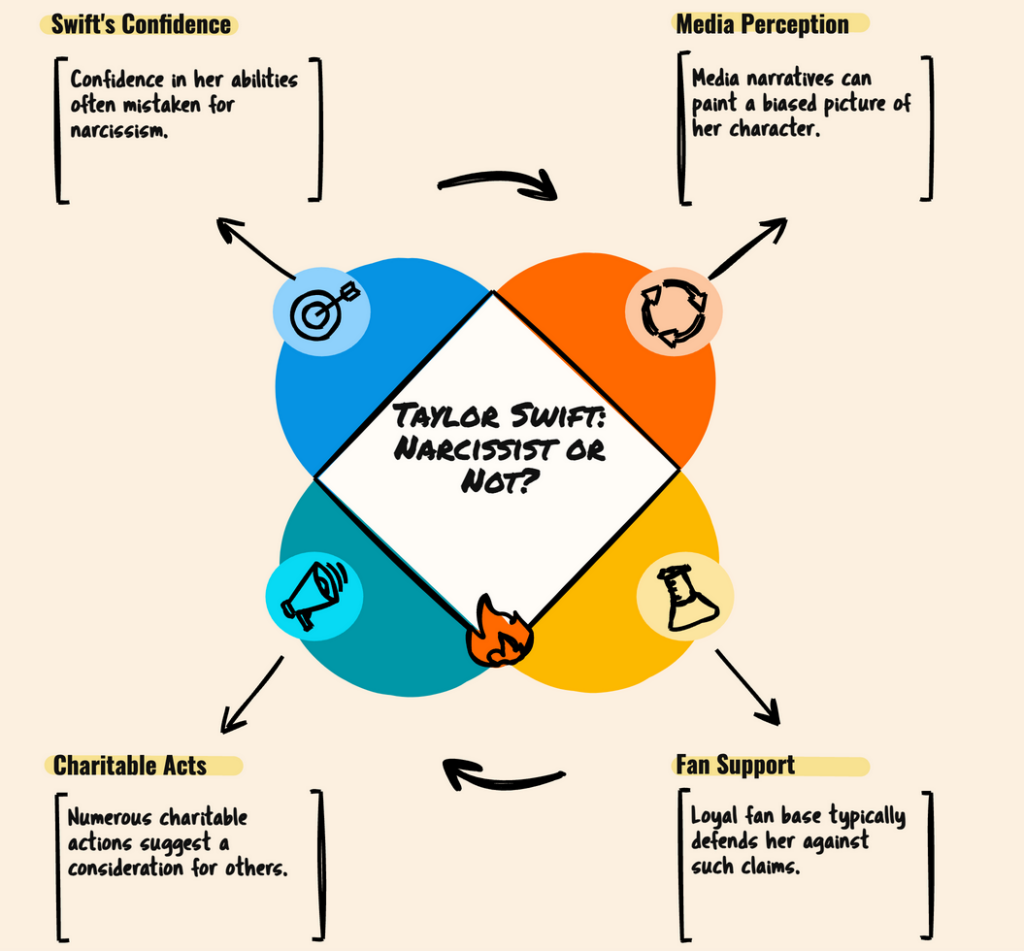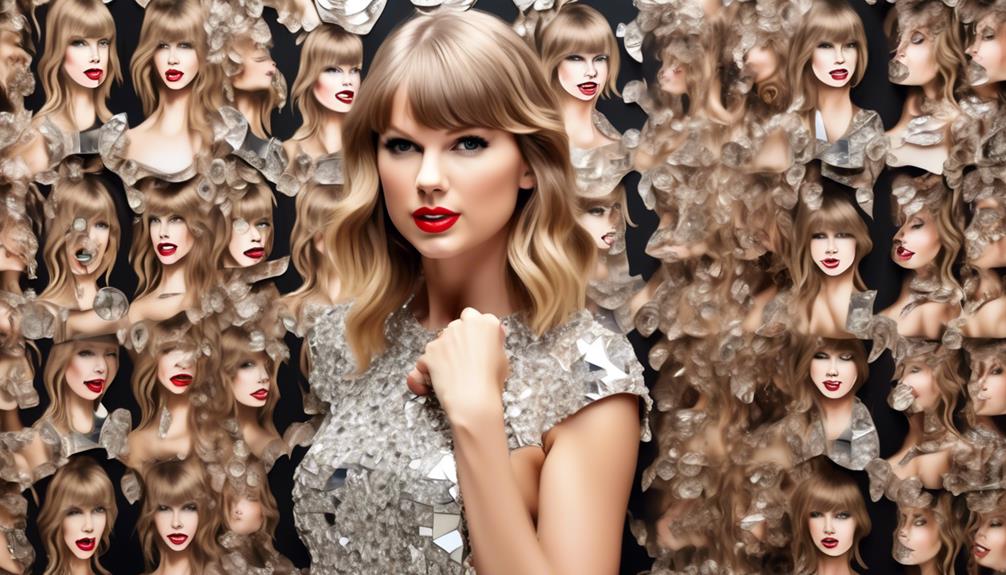Delving into the intriguing world of celebrity psychology, it’s fascinating to note how often Taylor Swift is mentioned with a specific description. With a whopping 40 million followers on Twitter alone, Taylor Swift’s influence is undeniable.
However, as we explore the question of whether Taylor Swift is a narcissist, it becomes apparent that the answer may not be as straightforward as it seems. The complexities of fame, image crafting, and media scrutiny all play into this captivating discussion.
Key Takeaways
- Swift’s public image and behavior raise questions about authenticity and manipulation.
- Conclusions drawn from external sources may not fully reflect the complexity of her character.
- Swift’s music showcases her artistic versatility and debunks the notion of a one-dimensional persona.
- Media portrayal can magnify certain traits, leading to exaggerated perceptions and misinterpretations.
Taylor Swift’s Public Image and Behavior
In examining Taylor Swift’s public image and behavior, critics have raised concerns about the authenticity of her persona amidst her successful career as a versatile artist. Swift’s ability to connect with fans emotionally through her music has been a cornerstone of her public image.
However, some critics have pointed to what they perceive as narcissistic traits in her behavior, particularly in her use of high-profile breakups and personal dramas to fuel her songwriting. This has led to debates about whether Swift’s image as a relatable anti-hero is genuine or a calculated persona crafted to maintain her public image.

Swift’s engagement with fans online, while enhancing her approachability, has also been scrutinized for signs of covert narcissism, where her interactions may serve to bolster her own ego rather than genuinely connect with her audience.
The dynamics between Swift’s public persona and the accusations of narcissistic behavior raise questions about the line between authenticity and manipulation, shedding light on the complexities of navigating fame while avoiding the pitfalls of narcissistic abuse.
Analyzing Taylor Swift’s Relationships

Analyzing Taylor Swift’s relationships offers a window into her personal development and the impact of media and public perception on her experiences. When delving into Taylor Swift’s romantic relationships, it’s crucial to approach the analysis with sensitivity and a nuanced perspective. While some have speculated about covert narcissism in her behavior, it’s essential to remember that conclusions drawn solely from external sources may not always reflect the full complexity of her character.
Taylor Swift’s relationship history has been the subject of intense scrutiny, with both admiration and criticism directed her way. The dynamics of her relationships, as portrayed in the media, can often be misleading, requiring a deeper understanding of the complexities involved. In assessing Taylor Swift’s interactions, the concepts of healthy relationships and empathy play a significant role.
To truly comprehend Taylor Swift’s relational patterns, it’s imperative to consider the potential impact of narcissistic abuse and the challenges of maintaining authentic connections in the public eye. By examining her relationships with a balanced and informed perspective, we can gain valuable insights into her personal journey and growth.
Taylor Swift’s Music and Persona
Taylor Swift’s music encapsulates a diverse range of genres, highlighting her artistic versatility. Her songs delve into various themes, from addressing critics and feuds with other celebrities to exploring vulnerable aspects of her persona. This multifaceted approach debunks the notion of a one-dimensional, narcissistic persona and showcases a deeper emotional complexity. Through tracks like ‘Dress’ and ‘Gorgeous,’ Swift connects with her audience on themes of love and desire, resonating with those who have experienced similar emotions.
| Taylor Swift’s Music | Themes |
|---|---|
| ‘Look What You Made Me Do’ | Addressing critics and feuds |
| ‘Bad Blood’ | Confronting conflicts |
| ‘Anti-Hero’ | Revealing vulnerability |
Swift’s ability to navigate through different genres and lyrical content displays a nuanced approach to her artistry. While criticisms and controversies have surrounded her career, her music continues to evolve, offering listeners a glimpse into her experiences and emotions.
Media Perception of Taylor Swift

Amidst ongoing discussions about Taylor Swift’s public image, there’s a notable focus on the media’s perception of her, particularly in relation to potential narcissistic traits. The scrutiny of her actions and behaviors by the media has led to speculations about narcissism, with some suggesting that her carefully curated public persona may indicate underlying narcissistic tendencies. Swift’s strategic use of social media to shape her narrative and the intense public interest in her relationships have all contributed to the ongoing debate surrounding her character and mental health.
The covert nature of narcissism makes it challenging to definitively label someone as such based on external observations alone.
Media portrayals of celebrities can often magnify certain traits, leading to exaggerated perceptions and misinterpretations.
It’s crucial to approach discussions about public figures’ mental health with sensitivity and a nuanced understanding of the complexities involved.
Criticism and Controversies Surrounding Taylor Swift
Critics and controversies often swirl around Taylor Swift, highlighting the complexities of her public persona and career.
The recent analysis of her song ‘Anti-Hero’ in relation to narcissistic traits has sparked speculation about Swift potentially embodying covert narcissism. Covert narcissists often disguise their self-centered tendencies as altruism, manipulating situations to cater to their desires while maintaining a facade of selflessness.
It’s important to note that narcissism exists on a spectrum, with varying degrees of severity and manifestation. While some argue that Swift’s actions align with covert narcissistic behaviors, others believe she exhibits traits common in public figures navigating intense scrutiny.
The discussion surrounding Swift’s possible covert narcissism underscores the challenges of interpreting celebrity personas and the complexities of human behavior. Ultimately, delving into these controversies prompts a deeper examination of how we perceive and critique public figures in the spotlight.
Frequently Asked Questions
What Is the Most Narcissistic Personality Type?
When considering the most narcissistic personality type, it’s crucial to look at traits like grandiosity, lack of empathy, and a constant need for admiration.
These characteristics often align with Narcissistic Personality Disorder (NPD), a condition marked by an inflated sense of self-importance and a deep-seated need for excessive attention and admiration.
Understanding these traits can shed light on the complexities of narcissistic behavior and its impact on individuals and relationships.
Do Narcissists Know They Have Narcissism?
Yes, narcissists may lack self-awareness due to their skewed perception of reality. They often struggle to acknowledge their narcissistic traits, as it threatens their self-image. This reluctance stems from a fear of vulnerability and a need to control situations.
Despite occasional moments of reflection, many narcissists remain blind to their behaviors, believing others are at fault. This denial can hinder personal growth and relationships, perpetuating harmful patterns.
Are Narcissists Born Narcissistic?
Narcissists are believed to have a genetic predisposition towards narcissism. Research suggests that genetic factors play a role in the development of narcissistic traits.
However, environmental influences like upbringing and life experiences also contribute to the manifestation of narcissistic behaviors.
While genetics may lay the foundation, it’s the interplay between nature and nurture that shapes a person’s narcissistic tendencies.
Understanding this complexity is crucial in comprehending the origins of narcissism.
Do Narcissists Make Narcissists?
In exploring if narcissists make narcissists, we see a complex interplay of nature and nurture. While genetics may predispose individuals to narcissistic traits, environmental factors like upbringing and experiences also play a significant role.
Understanding these dynamics can shed light on how narcissistic behaviors develop and perpetuate within certain contexts. It’s crucial to consider the multifaceted influences at play when examining the origins and perpetuation of narcissism.
Conclusion
In conclusion, while debates about Taylor Swift’s alleged narcissistic traits persist, it’s important to consider the limitations of analyzing her persona solely through her music and public image.
One interesting statistic to note is that Taylor Swift has been in the music industry for over 15 years, consistently reinventing herself and maintaining a dedicated fan base.
This longevity and ability to evolve suggest a deeper complexity beyond simple labels like ‘narcissist.’











